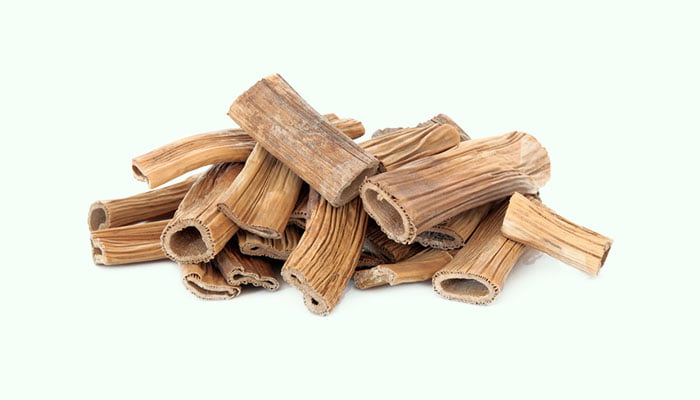What Is Lu Gen
Lu Gen also known as Rhizoma Phragmitis or Reed Rhizome is the rhizome of Phragmites communis, which is a perennial aquatic herb belonging to the family Gramineae. It first appeared in <Shennong Ben Cao Jing> in the late Western Han Dynasty (around 100 BCE).
There are 10 species of Phragmites, which are widely distributed in temperate and tropical regions of Oceania, Africa, and Asia.
Such plants are common landscape plants and are often used for soil conservation and embankment reinforcement. Their reed poles can be made into paper, rayon, rayon, and summer mats. Their tender stems and leaves can be made into fodder. Their inflorescences can be made into brooms.
Phragmites communis often grows in rivers, lakes, swamps, ponds, ditches, and low wetlands. In addition to not growing in the forest, they can grow in open areas with water sources.

In any season, people can gather Phragmites communis. People gather the rhizomes of Phragmites communis, remove their fibrous roots and buds, cut them into sections, use them directly, or dry them in the sun, and make them into Chinese herbal medicines.
Lu Gen contains polysaccharides, β-sitosterol, daucosterol, stigmasta-1-en-one, 24-methylenecholesten, stigmasta-1,23-dien-3-ol, 24-ethylcholesterol, physcion, tricin, gentianic acid, vanillin, p-hydroxyben-zaldehyde, ferulic acid, 5-hydroxymethyl furfural, caffeic acid, coixol, simiarenol, thiamine, alkaloids, fatty acids, and fatty esters.
Generally, Lu Gen with a flat cylindrical shape, hard nodes, and yellowish-white cross-section is preferred.
According to the Chinese Pharmacopoeia, the medicinal nature of Lu Gen is relatively cold, with a sweet taste. It has certain therapeutic effects on the pathological changes of the lung and stomach meridians.
In traditional Chinese medicine, it is often used to clear heat and purge fire, promote the production of body fluid and quench thirst, relieve restlessness, alleviate vomiting and induce diuresis, treat colds, influenza, bronchitis, bad breath, acute tonsillitis, lobar pneumonia, atrophic gastritis, chronic hepatitis, chronic persistent hepatitis, hepatitis B, cholecystitis, lung abscess, diabetes, kidney stones, esophageal reflux asthma, acne, and constipation.
There are about 50 kinds of Chinese medicine prescriptions containing it, such as vitamin C Yinqiao Pian, Sang Ju Yin, and Yin Chai He Ji.
Benefits
- Anti-oxidation, scavenging DPPH free radicals and hydroxyl free radicals and inhibiting the production of hydroxyl free radicals.
- Inhibiting Hela cells and B16 cells in vitro.
- Reducing liver and kidney damage induced by cadmium poisoning in mice.
- Reducing liver damage induced by CCL4 and protecting the liver.
- Enhancing SRBC-induced delayed-type allergy in mice, and improving the immune response function of T cells.
- Promoting the excretion of urinary oxalic acid, urinary calcium, and urea nitrogen, and inhibiting the formation of calcium oxalate stones.
- Reducing the serum total cholesterol, triacylglycerol, and low-density lipoprotein cholesterol content of hyperlipidemia mice, and increasing the high-density lipoprotein cholesterol content.
- Promoting the production of body fluid, treating the fever with restlessness, and thirst caused by consumption of body fluids in febrile diseases.
- Clearing stomach heat, treating vomiting caused by stomach heat.
- Clear lung heat, treat lung abscesses, cough caused by lung heat, or wind-heat.
- Inducing diuresis, treating scanty dark urine, difficulty and pain in micturition, and heat stranguria.
- Studies have found that it has an estrogen-like effect, which can promote the growth of the breast, fallopian tubes, uterus, and ovaries.
Combinations
- It can be used in combination with Mai Dong (Radix Ophiopogonis), Tian Hua Fen (Radix Trichosanthis), etc. to treat the fever with restlessness, and thirst caused by consumption of body fluids in febrile diseases.
- It can be used in combination with Zhu Ru (Bamboo Shavings), Sheng Jiang (Rhizoma Zingiberis Recens), etc. to treat vomiting caused by stomach heat.
- It can be used in combination with Huang Qin (Radix Scutellariae), Chuan Bei Mu (Fritillaria Cirrhosa), Gua Lou (Fructus Trichosanthis), etc. to treat cough caused by lung heat.
- It can be used in combination with Sang Ye (Mulberry Leaf), Ju Hua (Flos Chrysanthemi), Ku Xing Ren (Bitter Apricot Seed), etc. to treat cough caused by wind-heat.
- It can be used in combination with Bai Mao Cen (Rhizoma Imperatae), Che Qian Zi (Semen Plantaginis), etc. to treat scanty dark urine, difficulty, and pain in micturition.
Side Effects
- At present, there is no data showing that Lu Gen has toxic effects, and no reports of serious adverse reactions have been found when taking it at the prescribed dose.
- Long-term or overdose may cause stomach pain, fatigue, loss of appetite, or loose stools.
Precautions and Warnings
- The dosage of Lu Gen should be controlled at 15-30g.
- When using fresh Lu Gen, the dose should be doubled.
- It can be made into decoctions, teas, or mashed into oral juice.
- People who are allergic to Lu Gen should not take it.
- It should not be taken at the same time as Ba Dou (Croton Seed).
- People with deficiency-cold in the spleen and stomach should not take it.
- Pregnant women, breastfeeding women, children, and the elderly should use it under the guidance of a doctor.
